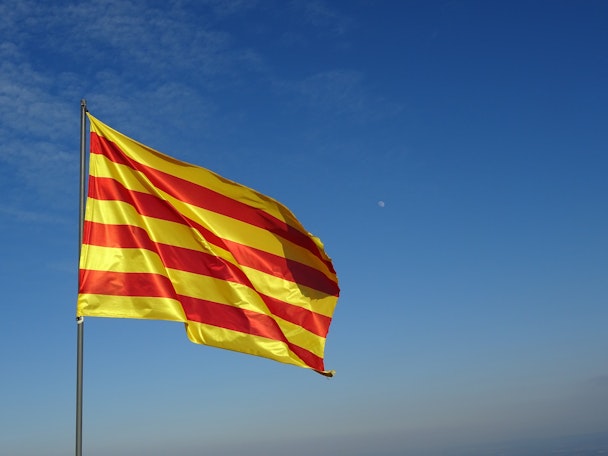Brand Catalonia cries freedom and the world is ready to listen
Catalexit, or the Catalan Spring, is firmly on everyone’s mind after Sunday’s bloody scenes.

The ‘illegal’ independence referendum has rocketed Brand Catalonia’s positioning as a freedom from oppression disruption brand into the stratosphere, hot on the anti-establishment heels of president Trump and UK Labour leader Jeremy Corbyn (almost).
This was the third referendum since 2009. In 2011, we were left with pretty much a 0-0 draw. This one left no room for doubt. A whopping 90% of Catalan voters said yes to freedom after a sizeable 42.3% turned out to vote. Back of the net!
Over the last 50 years, the Catalan brand has become a symbol of freedom and progressiveness standing up to oppression in the wake of general Franco’s fascist military dictatorship.
Disruptors like Antoni Gaudí, Joan Miró, Salvador Dalí, chef Ferran Adriá and Manchester City manager, Pep Guardiola have all been poster boys for Catalonia's particular brand of rebelliousness.
Thanks to social media and those ugly scenes created by over-zealous police, the sign that says rebel is lit up in neon across Catalonia for all to see.
Of course, that’s how anti-establishment brands work. The more the pressure to quash and control, the higher they fly. It’s a classic cause and effect model. Catalonia is flying high against its fascistic Spanish oppressors.
Madrid has been helping to build the brand for years with its over the top, oppressive behaviour.
From overturning Catalonia’s 2010 bullfighting ban last year to outlawing the language which is key to Catalan identity, Spain has repeatedly tried to bring the region to heel. Even Catalan names were banned at one time, forcing parents to choose Spanish names only.
Reliably, Wikileaks founder Julian Assange threw plenty of logs on the Twitter fire, helping to raise the heat and momentum by speaking to young digital-savvy voters who don’t want to be told what to do.
He tweeted: "A shock wave is coming and no trick is too dirty, no lie is too bold and no escalation is too much for a deep state to save itself. Watch."
The fate of president Rajoy, PP (Spain's ruling party), Spain's security services and judiciary hangs in the balance over Catalonia. A shock wave is coming and no trick is too dirty, no lie is too bold and no escalation is too much for a deep state to save itself. Watch.
— Julian Assange (@JulianAssange) September 29, 2017
Almost as if in competition with his fellow digital freedom fighter, Edward Snowdon also rallied to the cause, framing Catalonia's independence movement as a “human rights struggle”.
Russian news agency Sputnik gave a helping hand. According to The Atlantic, they posted 220 stories about the Catalan independence movement between September 11 and 27, giving prominence to the voice of Assange ahead of Catalan leader Carles Puigdemont or Spanish Prime Minister Mariano Rajoy.
All the while, wildly exaggerated metaphors of a “banana monarchy” and the battle language of “war”, “occupying power” and “liberation struggle” flew around cyberspace like a hail of bullets.
Meanwhile, back on the front line, more than 750 injured voters nursed their wounds as the Catalan government claimed victory for independence.
It just goes to show how times have changed the world over and how full-scale defiance armed with a powerful social media presence pitted against an oppressive force with haphazard PR can deliver cataclysmic results.
Barcelona, Catalonia's engine room, has always had the potential to the become a true freedom torchbearer.
As Freddie Mercury and Montserrat Caballé sang in the 1987 hit Barcelona, it shines “like a jewel in the sun”.
1992’s Olympic Games in Barcelona showcased the song and showed everyone just how little ol' Catalonia can successfully fuse together art, sport, cuisine and commerce.
That’s still the case today. Certainly, Catalan brands have never been shrinking violets.
Barcelona, the region's capital, is one of the most celebrated cities in modern Europe.
Barcelona football club is one of the biggest brands in the world, although it’s interesting to note that last year Madrid overtook it to become Spain’s most valuable club.
But perhaps it’s not all just about Catalonia wanting to be freed from the shackles of a militarised state.
A big reason for unrest might be resentment that their wealthy region has long subsidised the rest of the country.
Secessionists claim Catalonia offers more financial support to Spain than it receives from the central government in Madrid, a claim that was given legs by Spain's 2008 debt crisis.
With just 15% (7.5 million) of Spain’s total population, Catalonia contributes about 20% of Spanish GDP and more than a quarter of the country's exports.
In the battle to keep the peace and keep everyone together, Madrid scored an own goal by giving the separatists PR fodder in the form of violent scenes to go viral worldwide.
Interestingly, Wales in the UK and Catalonia share similar brand positioning.
Both share a red dragon logo as their branding strategies are deliberately aimed to differentiate them from their central governments, according to ‘Towards Effective Brand Management: Branding European Cities and Regions’, edited by Gregory Ashworth and Mihalis Kavaratzis.
Both brands have based their identity on their unique cultures, including language, history and cuisine. Culture forms an integral part of both Welsh and Catalan tourism strategy.
But in reality, Catalonia has a lot more in common with Scotland when it comes to population size and financial muscle.
Scotland’s first minister Nicola Sturgeon was quick to show solidarity with the freedom fighting separatists.
She wasted no time in condemning the violence, saying: “That kind of strength of feeling cannot simply be ignored.”
Madrid's poor handling by deploying overzealous police and trying to stop the vote has let a genie well and truly out of the lamp.
This is a merry dance that Barcelona is expert at leading, a flame that won’t now be easy to extinguish.
Watch this space.
